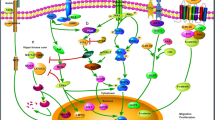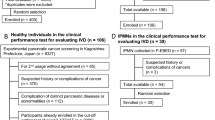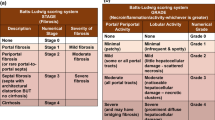Abstract
This case–control study aimed to evaluate the diagnostic application of urinary transforming growth factor (TGF) α and serum α-fetoprotein (AFP) in hepatocellular carcinoma (HCC). TGFα and AFP were determined in 90 pairs of age- and gender-matched patients with cirrhotic HCC and patients with cirrhosis alone and 60 healthy controls. The results indicated that TGFα and AFP levels in patients with HCC were higher than in those with cirrhosis alone or healthy controls (each P = 0.0001). Multivariate analysis indicated that TGFα (odds ratio (OR) 1.03, 95 % confidence interval (CI) 1.05–1.16) and AFP (OR 1.03, 95 % CI 1.01–1.06) were closely associated, in a dose-related fashion, with the development of HCC. The optimal cutoff values, determined with the receiver operating characteristic (ROC) curves, were 29 μg/g creatinine for TGFα and 100 ng/ml for AFP, respectively. The areas under ROC curve (AUC) were 0.74 for TGFα and 0.78 for AFP, respectively. Both biomarkers showed the same sensitivity (52.2 %), high specificity, high positive predictive value, and moderate positive likelihood ratio. Determination of both markers in parallel significantly increased the AUC (0.91) and diagnostic accuracy (92.2 %), with a high sensitivity (86.7 %), specificity (97.8 %), positive predictive value (PPV; 97.5 %), and moderate positive likelihood ratio (PLR; 39.4). Among 31 cirrhotic HCC with AFP ≤ 20 ng/ml, the calculated AUC for TGFα was 0.79, with a sensitivity of 64.5 %, specificity of 96.7 %, PPV of 87.0 %, and PLR of 19.5. In conclusion, urinary TGFα and serum AFP are complementary tumor markers for detection of HCC with low AFP production.



Similar content being viewed by others
References
Forner A, Llovet JM, Bruix J. Hepatocellular carcinoma. Lancet. 2012;379:1245–55.
Surveillance, Epidemiology, and End Results (SEER) Program. SEER*Stat database: incidence—SEER 9 Regs research data, Nov 2009 Sub (1973–2007). Bethesda: National Cancer Institute; 2010.
El-Serag HB. Hepatocellular carcinoma. N Engl J Med. 2011;365:1118–27.
Terentiev AA, Moldogazieva NT. alpha-Fetoprotein: a renaissance. Tumor Biol. 2013;34:2075–91.
Ferenci P, Fried M, Labrecque D, Bruix J, Sherman M, Omata M, et al. World Gastroenterology Organisation global guideline. Hepatocellular carcinoma (HCC): a global perspective. J Gastrointest Liver Dis. 2010;19:311–7.
Jeng JE, Chuang LY, Chuang WL, Tsai JF. Serum Dickkopf-1 as a biomarker for the diagnosis of hepatocellular carcinoma. Chin Clin Oncol. 2012;1:4.
Tsai JF, Jeng JE, Chuang LY, You HL, Wang LY, Hsieh MY, et al. Serum insulin-like growth factor-II as a serologic marker of small hepatocellular carcinoma. Scand J Gastroenterol. 2005;40:68–75.
Wang L, Yao M, Dong Z, Yun Z, Yao D. Circulating specific biomarkers in diagnosis of hepatocellular carcinoma and its metastasis monitoring. Tumor Biol. 2013. doi:10.1007/s13277-013-1141-0.
Trevisani F, D'Intino PE, Morselli-Labate AM, Mazzella G, Accogli E, Caraceni P, et al. Serum alpha-fetoprotein for diagnosis of hepatocellular carcinoma in patients with chronic liver disease: influence of HBsAg and anti-HCV status. J Hepatol. 2001;34:570–5.
Tsai JF, Jeng JE, Chuang LY, Yang ML, Ho MS, Chang WY, et al. Clinical evaluation of urinary transforming growth factor-β1 and serum α-fetoprotein as tumor markers of hepatocellular carcinoma. Br J Cancer. 1997;75:1460–6.
Tsai JF, Jeng JE, Chuang LY, You HL, Ho MS, Lai CS, et al. Serum insulin-like growth factor-II and alpha-fetoprotein as tumor markers of hepatocellular carcinoma. Tumor Biol. 2003;24:291–8.
Bruix J, Sherman M. Management of hepatocellular carcinoma. Hepatology. 2005;42:1208–36.
Shen Q, Fan J, Yang XR, Tan YX, Zhao WF, Xu Y, et al. Serum DKK1 as a protein biomarker for the diagnosis of hepatocellular carcinoma: a large-scale, multicentre study. Lancet Oncol. 2012;13:817–26.
Jeng JE, Chuang LY, Chuang WL, Tsai JF. Insulin-like growth factor II in hepatocellular carcinoma. Biomark Med. 2007;1:261–71.
Fausto N, Campbell JS. Liver regeneration. In: Arias IM, Alter HJ, Boyer JL, Cohen DE, Fausto N, Shaftritz DA, Wolfoff AW, editors. The liver: biology and pathobiology. 5th ed. Hoboken: Wiley-Blackwell; 2009. p. 549–66.
Harada K, Shiota G, Kawasaki H. Transforming growth factor-alpha and epidermal growth factor receptor in chronic liver disease and hepatocellular carcinoma. Liver. 1999;19:318–25.
Pannain VL, Morais JR, Damasceno-Ribeiro O, Avancini-Alves V. Transforming growth factor α immunoreactivity. A study in hepatocellular carcinoma and in non-neoplastic liver tissue. Ann Hepatol. 2012;11:495–9.
Shiraha H, Yamamoto K, Namba M. Human hepatocyte carcinogenesis. Int J Oncol. 2013;42:1133–8.
Zhang J, Wang WL, Li Q, Qiao Q. Expression of transforming growth factor-alpha and hepatitis B surface antigen in human hepatocellular carcinoma tissues and its significance. World J Gastroenterol. 2004;10:830–3.
Tomiya T, Fijiwara K. Serum transforming growth factor alpha level as a marker of hepatocellular carcinoma complicating cirrhosis. Cancer. 1996;77:1056–60.
Yeh MM, Larson AM, Campbell JS, Fausto N, Rulyak SJ, Swanson PE. The expression of transforming growth factor-α in cirrhosis, dysplastic nodules, and hepatocellular carcinoma: an immunohistochemical study of 70 cases. Am J Surg Pathol. 2007;31:681–9.
Yeh YC, Tsai JF, Chuang LY, Yeh HW, Tsai JH, Florine DL, et al. Elevation of transforming growth factor alpha and its relationship to the epidermal growth factor and alpha-fetoprotein levels in patients with hepatocellular carcinoma. Cancer Res. 1987;47:896–901.
Chuang LY, Tsai JH, Yeh YC, Chang CC, Yeh HW, Guh JY, et al. Epidermal growth factor-related transforming growth factors in the urine of patients with hepatocellular carcinoma. Hepatology. 1991;13:1112–6.
Greene FL, Page DL, Fleming ID, Fritz A, Balch CM, Haller DG, Morrow M, eds. AJCC cancer staging manual. 6th ed. Chicago: Springer; 2002. p. 435.
Tsai JF, Chang WY, Jeng JE, Wang LY, Hsieh MY, Chen SC, et al. Hepatitis C virus infection as a risk factor for non-alcoholic liver cirrhosis in Taiwan. J Med Virol. 1993;41:296–300.
Pugh RN, Murray-Lyon IM, Dawson JL, Peitroni MC, Williams R. Transection of the esophagus for bleeding esophageal varices. Br J Surg. 1973;60:646–9.
Longo DL, Kasper DL, Jameson JL, Fauci AS, Hauser SL, Loscalzo J. Harrison's principles of internal medicine, 18th ed: Chapter 3. Decision-making in clinical medicine. New York: McGraw-Hill; 2012. http://www.accessmedicine.com.
Swets JA. Measuring the accuracy of diagnostic systems. Science. 1988;240:1285–93.
Baker SG. Improving the biomarker pipeline to develop and evaluate cancer screening test. J Natl Cancer Inst. 2009;101:1116–9.
Balcan E, Demirkiran F, Aydin Y, Saniogluc C, Bese T, Arvas M, et al. Serum levels of epidermal growth factor, transforming growth factor, and c-erbB2 in ovarian cancer. Gynecol Cancer. 2012;22:1138–42.
Yoshida K, Kyo E, Tsuda T, Tsujino T, Ito M, Niimoto M, et al. TGF-alpha, the ligands of hyperproduced EGFR in human esophageal carcinoma cells, act as autocrine growth factors. Int J Cancer. 1990;45:131–5.
Saeki T, Salomon DS, Johnson GR, Gullick WJ, Mandai K, Yamagami K, et al. Association of epidermal growth factor-related peptides and type I receptor tyrosine kinase receptors with prognosis of human colorectal carcinoma. Jpn J Clin Oncol. 1995;25:240–9.
Fanelli MF, Chinen LT, Beqnami MD, Costa WL, Fregnami JH, Soares FA, et al. The influence of transforming growth factor-α, cyclooxygenase-2, matrix metalloproteinase (MMP)-7, MMP-9 and CXCR4 proteins involved in epithelial-mesenchymal transition on overall survival of patients with gastric cancer. Histopathology. 2012;61:153–61.
Giricz O, Calvo V, Peterson EA, Abouzeid CM, Kenny PA. TACE-dependent TGFα shedding drives triple-negative breast cancer cell invasion. Int J Cancer. 2013;133:2587–95.
Acknowledgments
This work was supported in part by grants from the National Science Council of the Republic of China (NSC 93-2314-B-037-079) and the Kaohsiung Medical University Hospital (KMUH 97-7R26).
Conflicts of interest
None
Author information
Authors and Affiliations
Corresponding authors
Additional information
J.-E. Jeng, H.-R. Tsai, and M.-F. Tsai contributed equally to this work.
Rights and permissions
About this article
Cite this article
Jeng, JE., Tsai, MF., Tsai, HR. et al. Urinary transforming growth factor α and serum α-fetoprotein as tumor markers of hepatocellular carcinoma. Tumor Biol. 35, 3689–3698 (2014). https://doi.org/10.1007/s13277-013-1488-2
Received:
Accepted:
Published:
Issue Date:
DOI: https://doi.org/10.1007/s13277-013-1488-2




